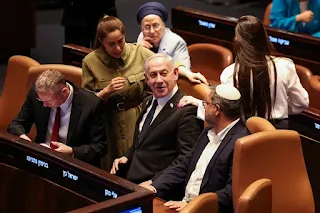Following the 2022 elections, Israel emerged with the most right-wing and extremist government in its history, led by Benjamin Netanyahu, who opted for an alliance with hardline religious and fascist forces, most notably the Jewish Power and Religious Zionism parties. The coalition also included partners from the ultra-Orthodox movement, known for its social isolation and refusal to perform military service, despite enjoying extensive economic and political privileges. This coalition, based on profound ideological concessions, appears fragile by nature, but it holds the reins of power under exceptional circumstances.
Since the outbreak of the war on Gaza, this coalition has been a barrier to any attempt to reach a ceasefire or a prisoner exchange agreement. Fascist right-wing parties have repeatedly threatened Netanyahu with withdrawing from the government if he refrains from continuing the war, prompting him to use the situation as a pretext to evade mounting international and American pressure. To this day, despite indirect talks with Hamas, this political threat continues to limit Netanyahu's room for maneuver and complicate the chances of ending the war.
But the crisis does not stop at the government. The war—its prolonged duration and the Israeli army's failure to resolve it—has created a deep internal rift within Israeli society. This rift is increasingly manifesting itself in a conflict between the secular movement and the ultra-Orthodox community, threatening to transform the political divide into a sharp societal rift, with far-reaching repercussions for the shape and internal fabric of the Israeli state.
This escalating debate within Israel boils down to a highly sensitive equation: the Gaza war, now in its second year, has inflicted unprecedented human losses on the Israeli army, with thousands killed and more than 20,000 wounded, both physically and psychologically, unable to return to the battlefield. This human cost has burdened both the regular army and its reserves, forcing them to continue fighting for months on end, negatively impacting the lives of soldiers and their families and exacerbating tensions within Israeli society.
In this context, political and popular calls have escalated to reconsider the "historic agreement" exempting the Haredim from military service since 1948, and to demand their participation in the war effort on a par with other Israelis. Pressure has mounted within the ruling coalition itself, as well as among the opposition, to revoke the privileges enjoyed by the Haredim, even if this requires imprisoning those who refuse to serve.
In contrast, the Haredi parties, along with religious authorities, expressed a categorical rejection of any infringement on their religiously-based lifestyle and refused conscription under any circumstances. With Netanyahu's efforts to reach a compromise that would postpone the crisis until after the war faltering, the army's chief of staff took the unprecedented step of sending thousands of conscription orders to the Haredim, sparking widespread protests within their ranks.
The dispute reached its peak when the case was brought before the Supreme Court, demanding a legal opinion obligating the government to conscript Haredim. This threatens to unleash a complex political and social crisis that could undermine the cohesion of the ruling coalition and reshuffle the cards across the Israeli landscape.
Faced with mounting domestic pressure and Benjamin Netanyahu's failure to deliver on his repeated promises to the Haredi parties regarding exemption from military service, the Haredim decided to take a serious threatening step: they resigned from their ministerial positions and abstained from supporting bills proposed by the ruling coalition. However, they kept a lid on Netanyahu's relationship, giving him until the end of October, after the Knesset returns from its summer recess, to submit a bill formally enshrining their exemption from military service.
Thus, the Israeli government is literally dependent on the will of the Haredim, and its political fate is now tied to the issue of military exemption. However, the question remains: Can Netanyahu pass such a law within his divided coalition? The answer is not yet clear.
In this critical context, with increasing international pressure, particularly from the United States, demanding an end to the war on Gaza, as well as mounting popular anger within Israel due to the rising death toll and the pressure from prisoners' families, Netanyahu's options are shrinking by the day. His room for maneuver is becoming limited, especially given the deep divisions within his government between the fascist right on one side and the ultra-Orthodox on the other.
The scenarios before Netanyahu are all thorny: either the Haredim or the extreme right will bring him down, or he will take the initiative to dissolve the government and call early elections, hoping to market himself to Israeli voters as someone who "recovered the prisoners" and achieved "victories" in Gaza, Iran, Lebanon, Syria, and perhaps Yemen as well. As for the option of reaching an interim agreement with Hamas or a permanent ceasefire, it appears, for now, to be the weakest and most remote option from Netanyahu's political calculations.
All published articles express the opinion of their authors and do not necessarily reflect the views of TRT Arabic.





